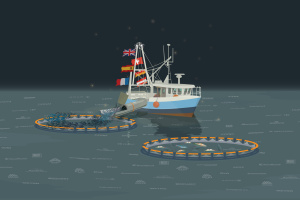Feeding a Monster: How European aquaculture and animal industries are stealing food from West African communities

Executive summary
Globally, one billion people rely on fish as their main source of animal protein, according to the United Nations (UN) World Health Organization (WHO). However, poor governance, illegal, undeclared and unregulated (IUU) fishing and overexploitation of fish stocks by industries like the global fishmeal and fish oil (FMFO) industry is leaving behind a trail of severe consequences for local populations, depriving them of one of their most important food sources and means of income in order to feed a broken food system. This report shows a clear example of exactly that.
Each year, over half a million tonnes of fish – which could feed over 33 million people in the region – are instead being extracted from the ocean along the coast of West Africa and converted to FMFO in order to feed farmed fish and livestock, mostly in Europe and Asia. Virtually all FMFO produced in West Africa is exported for the benefit of other sectors – such as aquaculture, agricultural farming, dietary supplements, cosmetics and pet care – in third countries, most of them outside the African continent, in contradiction with international commitments on sustainable development, poverty alleviation, food security and gender equality.
This practice is not only undermining food security in coastal communities of Mauritania, Senegal and The Gambia but is also depriving people living in the interior of Senegal and non-coastal countries such as Mali and Burkina Faso of one of their most essential sources of protein. According to the UN Food and Agriculture Organization (FAO), the main fish species the FMFO industry in West Africa uses – sardinella and bonga – are already overexploited, posing ‘a serious threat to food security in the subregion’. The FMFO industry thereby contributes to the exacerbation of social hardship and accelerates the depletion of fish resources, which threatens marine ecosystems and weakens the economies of several countries.
The bulk of the FMFO sourced from West Africa goes into feeding aquaculture, a voracious industry that is already providing over half of global fish consumption and is expected to grow further to reach 60% of total global fish consumption by 2030. Furthermore, resource-intensive fed aquaculture has far outpaced non-fed aquaculture, making up nearly 70% of all aquaculture production in 2018. The EU is a major market for West African fish oil. In 2019, more than 70% of the fish oil Mauritania exported was destined for the EU.
PARTNERS

You might also like...

Überfischung: Wildfisch als Fischfutter in Aquakulturen – Schweizer Detailhändler im Vergleich
This report outlines how effectively Swiss retailers are safeguarding the health of the oceans and fish welfare through the sustainability of their aquaculture supply chains. Read our German language report:

Floundering Around: An assessment of where European retailers stand on the sourcing of farmed fish
This report offers a comparative review of 49 leading European supermarket chains’ policies on farmed fish. Based on extensive research it identifies leaders and laggards.

Atrapados: Cómo los supermercados españoles abordan el empleo de pescado salvaje en su cadena de suministro acuícola
This report looks at how effectively Spanish supermarkets are safeguarding the health of the oceans, through the sustainability of their farmed fish supply chains. Read our Spanish language report: